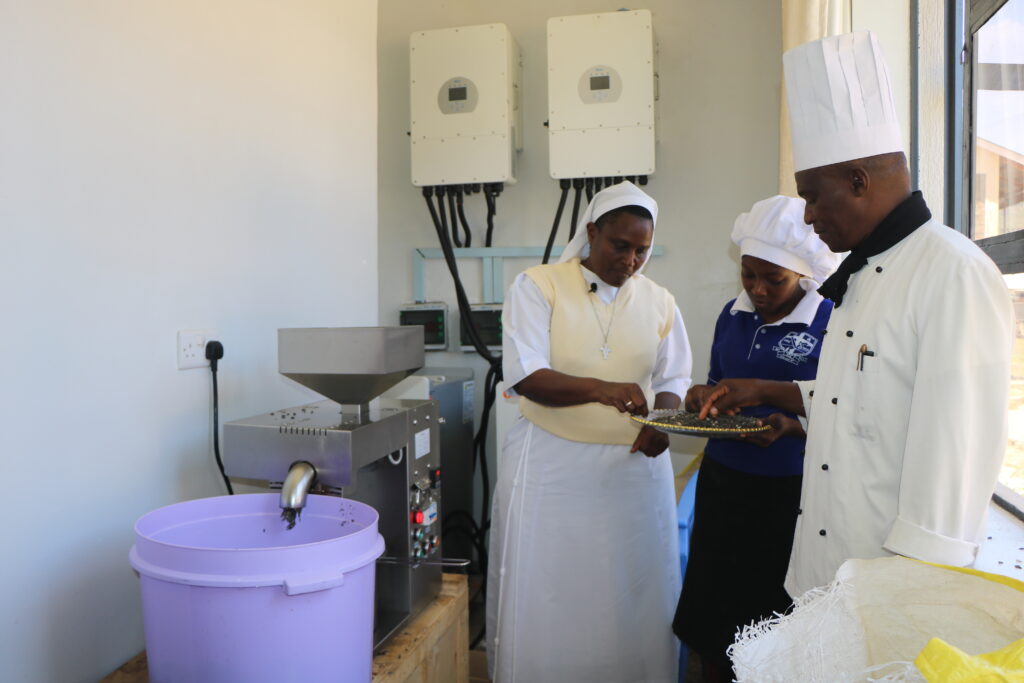In a very remote area of Lower Subukia, where dusty roads and the scarcity of water mark daily life, a quiet transformation is underway. Sr. Victorina Wanjiru, a dedicated member of the Little Sisters of St. Francis, has ignited hope and change through her innovative St. Elizabeth Demo Farm. Established in 2018 under the charism of the Foundress of Little Sisters of St. Francis (LSOSF), Mother Mary Kevin Servant of God, the project is a beacon of sustainable farming, environmental conservation, and better nutrition for the local, especially women.
Her deep connection to her hometown is the driving force behind the project. Having experienced the hardships firsthand, she resonates with the struggles faced by the locals
“I grew up in this place. I knew how hard it was. When I became a sister, I found the urge of giving back to my community. After celebrating my Jubilee, I asked my superiors, ‘Can we buy a farm in Lower Subukia’ So when something is God given, it just comes.”
The St. Elizabeth Demo Farm owes much of its progress to strategic partnerships. A significant ally in this journey is a German organization known as The Missionszentrale der Franziskaner (MZF), a German development charity association of the Franciscan order. Their support has been vital, not only funding the programs but also helping to establish the necessary infrastructure to ensure the farm’s success.
Beyond the fields, Sr. Victorina has empowered local women with practical, income-generating skills. One standout program teaches them how to make their own cooking oil from sunflower seeds. The process is beautifully communal: each woman plants sunflowers at her home, and when the seeds have matured, they come together at the school to extract the oil. Not only does this provide a valuable resource, but the leftover seed residue is repurposed—fed to animals and used as manure to further enrich the soil.

In 2021, the farm expanded its reach by launching a beekeeping program that now trains 170 local men. These men have formed a cooperative known as the Umoja Beekeepers around January of 2022. Under Sr. Victorina’s guidance, she supplies the necessary resources while the group members carry out the hands-on work. They visit the apiaries once a week, ensuring the hives are well cared for. The profits from honey sales are split evenly—50/50 between the farm and the Umoja Beekeepers—a model that not only builds economic resilience but also fosters a spirit of shared responsibility.
Life in Lower Subukia is not without its obstacles. The locals grapple with poor roads and an unreliable water supply, often forcing them to venture into nearby hilly areas where wild animals may roam. Yet, through her training, Sr. Victorina also imparts crucial skills in food preservation. By teaching methods to conserve foods during the wet season, she helps ensure that the community does not go hungry during the dry periods.
The impact of Sr. Victorina’s work has been nothing short of transformative. The project has breathed new life into an area long forgotten by the government. Locals are increasingly amazed by the tangible changes and the promise of a better future.
Naomi Kwamboka, a beneficiary of the program remarked how Sr. Victorina’s growing caring nature and attentiveness towards the motivate her and her peers, “A lot of us stay here at times and sister treats us like our mother. She provides us with everything, and even better she does not discriminate us on any basis. In return, that motivates us to even work hard in the farm so that we can all enjoy its produce”
Looking to the future, Sr. Victorina dreams of extending her vision to younger generations, particularly school dropouts and the often-neglected boy child. Her plan is to develop additional structures and training programs in skills such as tailoring and computer literacy, along with establishing boarding facilities.
In Lower Subukia, the fields of the St. Elizabeth Demo Farm are more than just plots of land—they are the foundation of hope, resilience, and community empowerment. Through sustainable practices and a deep commitment to the people she serves, Sr. Victorina Wanjiru is not only cultivating crops but also nurturing a brighter, more sustainable future for all.

